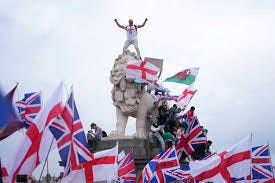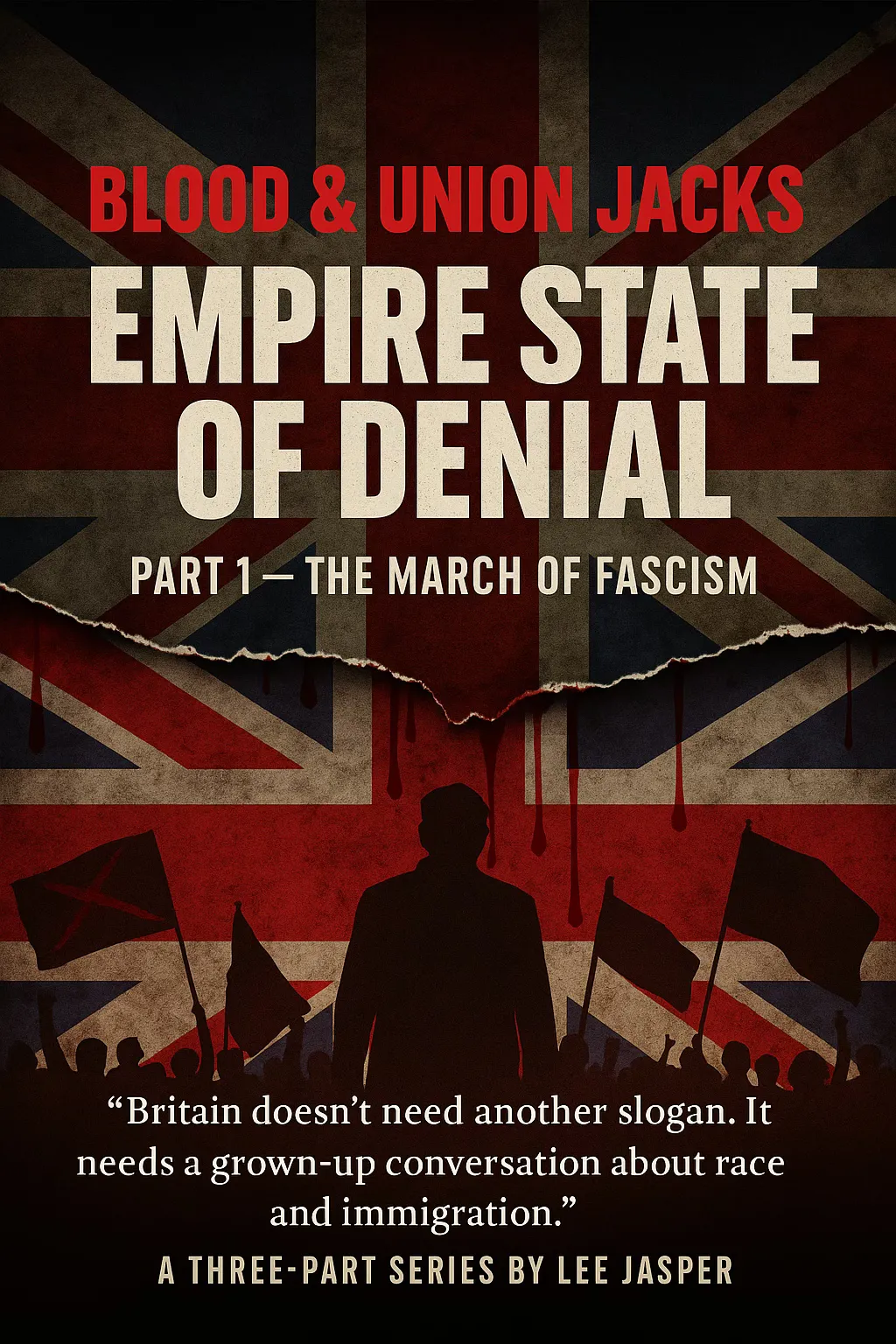Series Note
This essay is the first in a three-part series titled Blood & Union Jacks: Empire State of Denial. The title speaks to two realities. Blood refers both to the violence that stains our streets and to the poisonous politics of bloodline and exclusion — the idea that Black, Asian, and Muslim people can never be truly British, no matter how many generations we have lived here. Union Jacks captures how these hatreds are cloaked in patriotism, paraded under flags, and excused as national pride. And the Empire State of Denial points to the deeper problem: a Britain still refusing to reckon with its colonial past, still trapped in illusions about who belongs and who does not.
The series will be published on three consecutive days:
- Part 1 — Sunday 14th September: The March of Fascism
- Part 2 — Monday 15th September: The Collapse of Anti-Racism
- Part 3 — Tuesday 16th September: The Fightback
The timing is deliberate. On the evening of Tuesday 16th September at 6pm, the Humanity Project will convene its first national webinar. These essays set the stage for that conversation — not a lecture, not a manifesto handed down from on high, but the beginning of a grown-up national dialogue about race, immigration, belonging, and the future of Britain.
Introduction
One hundred and fifty thousand people filled London’s streets under Tommy Robinson’s “Unite the Kingdom” banner. He insists it was peaceful, inclusive, even anti-racist. But those of us who have fought this fight for decades know better. What marched was not unity but proto-fascism — draped in Union Jacks, chanting racist bile, and offering Britain a preview of the darkness to come.
This isn’t just about Robinson. It’s about a country drowning in denial, where racist violence can be wrapped in the flag and excused as patriotism. It’s about the emptiness of our politics, where the right exploits division and the left offers little more than silence or slogans.
That is why on Tuesday 16th September at 6pm, the Humanity Project will convene a national webinar. Not to lecture, not to dictate, but to begin a grown-up conversation about race and immigration — one rooted in honesty, empathy, and the recognition of each other’s humanity. Because unless we find the courage to talk to one another face to face, Britain will remain stuck in its empire state of denial.

Robinson’s March and Its Contradictions
Robinson paraded his march as proof that ordinary Britons stand with him. The truth was written in the chants that echoed from Stamford Street to Whitehall: “Allah, Allah, who the fuck is Allah?” and “You can shove Palestine up your arse.”Later, violence broke out. A Sikh supporter, draped in the Union Jack, was told he could never be British.
This is Robinson’s movement: not defenders of Britain, but carriers of its ugliest hatreds. He claims to stand against racism, yet welcomes racists to march under his banner. He claims inclusivity, but never expels fascists who attach themselves to his cause. Why? Because they are not outsiders. They are his base.
Robinson’s hypocrisy is not a mistake; it is his method. He thrives on contradictions, blurring the line between patriotism and racism, between free speech and hate speech, until the distinction collapses.
Bloodlines and Belonging
When I say blood, I mean more than the violence of street thuggery. I mean the growing call for a politics of bloodline. Across Europe and now here in Britain, the far right openly flirts with the language of remigration — the forced expulsion of Black and Brown people, Muslims, migrants, anyone deemed “un-British.”
This is not a fringe fantasy. It echoes the bloodline tests used in Israel, where citizenship and rights are determined by ancestry, not humanity. It creeps into British discourse when politicians and pundits imply that Islam is “incompatible” with Western values, as if millions of British Muslims were somehow foreigners in their own country.
It is there when the racist logic insists that a Black man born in Manchester is no more British than a dog born in a stable is a horse. This is Enoch Powell’s poisonous rhetoric, reheated and repackaged for the twenty-first century. It is a lie designed to strip away belonging, to make British-born Black and Asian citizens perpetual outsiders in the only country they have ever known.
I know this truth personally. I am third-generation Black British. My grandchildren are now the sixth generation. Yet despite those six generations of life, labour, and loyalty to this country, our place in Britain is not secure. Our future is not secure. Neither is that of our children.
That cannot stand. We must secure the viability of their futures or they will come to rue the consequences. Just as our parents fought for the 1965 Race Relations Act — legislation that tore down apartheid workplace practices and outlawed open racial discrimination — we must now bequeath to the next generation the same legal reassurances that were passed to us.
The year 2025 marks the 60th anniversary of that Act. If we fail to act now, we risk leaving our children a Britain where their rights and dignity are less secure than ours were. We must not let the politics of bloodline and exclusion dominate their futures.
The choice is stark. Either we build a new constitutional framework — rooted in accountability, transparency, and equality — or we invite a darker future for our children, the consequences of which will be catastrophic. The work of our generation is to secure the future, not just for ourselves, but for all who come after us.
Networks of Hate
Robinson dares to speak the language of equality while cosying up to racists and fascists across Britain, Europe, and the United States. This is not contradiction. This is his political architecture.
He has shared platforms with Steve Bannon, architect of Trump’s white nationalist strategy. He embraces Katie Hopkins, whose career is built on the dehumanisation of migrants and Muslims. At this very rally, Elon Musk — a man who once gave a Nazi-style salute — called openly for the dissolution of Parliament. Robinson nodded along. Imagine if a Black or Muslim activist had done the same. They would have been in handcuffs before nightfall.
This is Robinson’s genius and his danger: laundering fascism through patriotic rhetoric, packaging hatred as common sense, making extremism look like the voice of ordinary Britain. He provides cover for open racists by cloaking them in flags.
Symptom, Not Aberration
We cannot console ourselves that Robinson is a fringe figure. His 150,000 marchers prove otherwise. He has tapped into disillusionment, grievance, and the abandonment of whole communities. He offers recognition where the left offers lectures. He offers scapegoats where unions and Labour offer nothing.
Robinson is not the disease; he is a symptom. A symptom of a Britain stripped of empathy, stripped of education, stripped of solidarity. A Britain where working-class people, denied the intellectual armour once provided by unions and civic groups, are left naked before billionaire-funded propaganda machines.
Written by Lee Jasper, Chair APA










